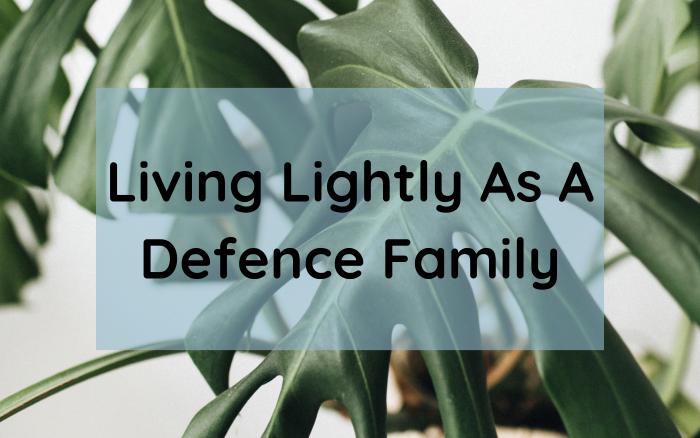Let’s be real.. Defence life already comes with enough moving parts.
You don’t need a garage full of “just in case” boxes to add to the mental load.
That’s where minimalism comes in. Not the Pinterest-perfect version with beige couches and three ceramic mugs. I’m talking about the kind of intentional living that gives you more breathing room, in your home, your head, and your calendar.
Why Minimalism Works (Especially for Defence Families)
When you move often, shift between rentals, and regularly reset your routines, minimalism stops being a trend, it becomes a sanity-saving strategy.
It’s about letting go of the “we might need this one day” energy and making room for what actually matters: connection, flexibility, space to think, and a home that feels calm (even if it’s temporary).
Here’s how it’s helped us, and how it might support you too.
Moving with Less = Stressing Less
Every time we relocate, we’re faced with the question: do we really want to move this again?
- Fewer boxes = faster moves
- Less stuff = easier unpacking
- Lighter loads = more flexibility when you land somewhere smaller (or when the layout makes zero sense)
Instead of dreading the logistics, minimalism helps you move with more ease, and less emotional attachment to things that don’t serve your current season.
A Calmer Home Means a Calmer Mind
Defence life is filled with unpredictability. Your home doesn’t have to be.
When you simplify your space, you create pockets of calm that anchor your nervous system, even if your partner’s away, the school just changed their bell times again, and the dog’s lost another toy in the backyard.
- Less clutter = fewer decisions
- Visual simplicity = mental clarity
- Intentional space = more room for connection (and let’s be honest, less yelling about where the scissors went)
Minimalism Saves Money (and Sanity)
This lifestyle isn’t always kind to the budget. Even with relocation entitlements, things add up: new uniforms, school supplies, utility setups, vehicle rego changes – the list goes on.
Minimalism doesn’t mean deprivation, it means spending with intention, not impulse.
- Buy less.
- Move less.
- Store less.
- Stress less.
You also make room in your budget for the good stuff:
→ A weekend away during leave
→ Upgrading one thing you use every day
→ Starting a family fund for future plans, not more plastic tubs
It’s Better for the Environment (and Your Kids Notice)
Every time we move, we’re reminded of how much we own, how much we’ve accumulated since the last move, and how much we don’t actually use.
Minimalism encourages us to consume less, reuse more, and teach our kids that stuff doesn’t equal security.
- Choose quality over quantity
- Reduce waste with intentional buying
- Show your children what slow, conscious living can look like, even during high-change seasons
You’d be surprised how quickly they start asking, “Do we really need this?”
It Keeps You Focused on What Matters Most
At its core, minimalism is about clarity.
And when your life is shaped by someone else’s roster, relocation timelines, or deployments, you learn to hold tighter to the things that truly matter – and let go of the rest.
Minimalism helps us:
- Focus on family time over stuff management
- Create rhythm and routine in unpredictable seasons
- Make room for our own goals, hobbies, or stillness (yes, even if that’s just five minutes of quiet tea-drinking in the morning)
It’s not about being aesthetic. It’s about being anchored.
Minimalism isn’t an all-or-nothing thing.
You don’t have to purge your whole house or live out of a suitcase to feel the benefits.
Maybe it’s starting with:
- Letting go of what no longer fits your season
- Creating one clutter-free room (or corner) that feels like home
- Saying no to the pressure to keep everything “just in case”
You’re already carrying enough.
Minimalism can lighten the load, in every way that counts.


